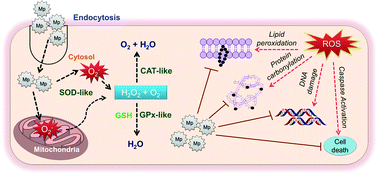A manganese oxide nanozyme prevents the oxidative damage of biomolecules without affecting the endogenous antioxidant system†
Abstract
Biocompatible nanoparticles with an intrinsic ability to mimic the cellular antioxidant enzymes are potential candidates for the development of new therapeutics for various oxidative stress related disorders. However, the understanding of the interaction and the mechanistic crosstalk between the nanoparticles and the cellular biomolecules is limited. Here we show that the multienzyme mimic manganese(II,III) oxide, Mn3O4, in nanoform (Mp) rescues the cells from oxidative damage induced by reactive oxygen species (ROS). The nanoparticles provide remarkable protection to biomolecules against the ROS-mediated protein oxidation, lipid peroxidation and DNA damage. Interestingly, the endogenous antioxidant machinery remains unaltered in the presence of these nanozymes, indicating the small molecule targeting of these nanoparticles in the cellular redox modulation. This study delineates the possible mechanism by which the nanoparticles provide protection to the cells against the adverse effects of oxidative stress. Based on our observation, we suggest that the multienzyme mimic Mn3O4 nanoparticles possess great potential in suppressing the oxidative stress-mediated pathophysiological conditions under which the antioxidant system is overwhelmed.



 Please wait while we load your content...
Please wait while we load your content...